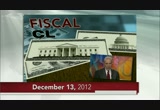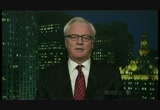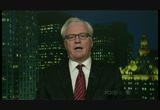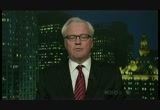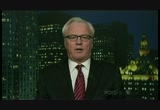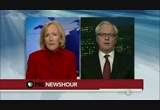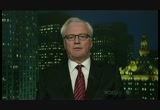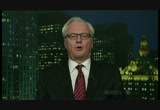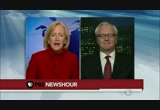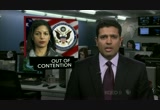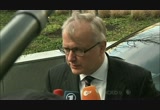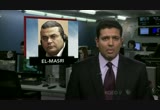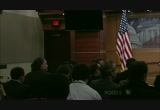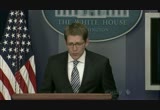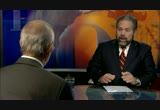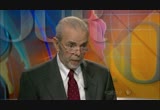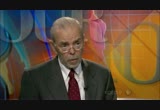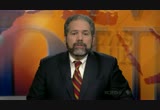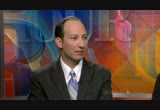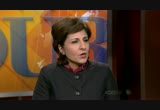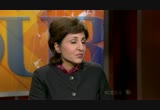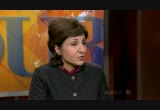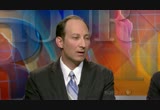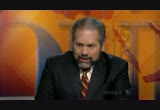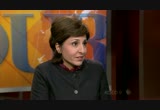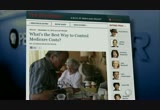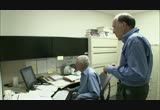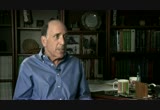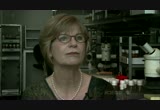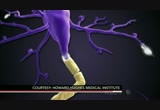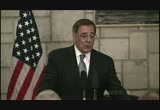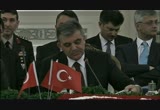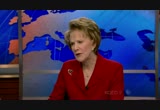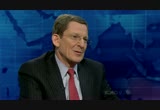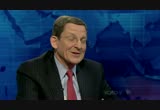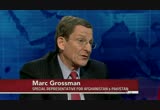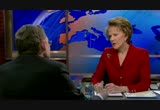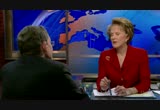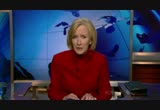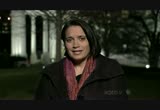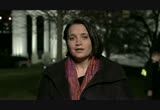tv PBS News Hour PBS December 13, 2012 3:00pm-4:00pm PST
3:00 pm
andrew kohut explains the latest poll numbers, showing strong support for the way president obama is handling the negotiations. >> the democrats are better regarded in this negotiation than the republicans by a lot. >> warner: plus ray >> warner: plus, ray suarez gets two views on proposals to raise the age of eligibility for medicare to 67, from 65. >> woodruff: it's bottoms up tonight for miles o'brien who reports on genetic links to alcoholism and other addictions. >> so far as i know, there's no law against reporting under the influence, so here goes something. >> warner: and we talk with ambassador marc grossman about prospects for afghanistan as the u.s. prepares to withdraw troops by 2014 and as he leaves his post as u.s. special envoy to the region. >> woodruff: that's all ahead on tonight's "newshour."
3:01 pm
>> major funding for the pbs newshour has been provided by: ♪ ♪ moving our economy for 160 years. bnsf, the engine that connects us. >> and by the alfred p. sloan foundation. supporting science, technology, and improved economic performance and financial literacy in the 21st century. >> and with the ongoing support of these institutions and foundations. and... >> this program was made possible by the corporation for public broadcasting.
3:02 pm
and by contributions to your pbs station from viewers like you. thank you. >> woodruff: violence continued across syria today as the united states welcomed a russian admission that syria's rebels may succeed in overthrowing president bashar al-assad. we may have a problem with that tape and we apologize. we'll try and get it together. if we're not able to -- we're going to go ahead and interview right now mr. vitaly churkin. he is russia's ambassador to the united nations. thank you for joining us. let me begin by asking you about the comment today made by your
3:03 pm
deputy foreign minister mr. bog don november. he said today "it is impossible to exclude a victory of the syrian opposition." how would you describe the situation in syria? >> well, you know i think he went on saying that the syrian government seems to be losing ground in the fighting with the opposition and i think this is obvious. but i don't think there is anything in that statement which one can welcome or not welcome. first of all, that doesn't mean that the trouble will end any time soon. the fighting may continue for a very long time still and the battle may keep going this way or the other way for a long time because you will recall when the crisis started the predictions were that it will last for two to four months and president assad is going to be toppled but that did not happen. another important thing to remember is that even if the current stage of the crisis were
3:04 pm
to end in the so-called victory of the opposition that would mean that real trouble in syria will only be starting you will recall that after saddam hussein was top. ed in iraq it was only the beginning of years of civil conflict and sectarian conflict in iraq which took over 100,000 lives of civilians. so something of this sort could well be happening in syria even after the so-called victory of the opposition. my point is that a political outcome, a political deal continues to be urgently needed in the situation in syria. >> woodruff: urgently needed. so does that mean that russia is now prepared to sit down and work toward a resolution that would involve different leadership? syria? >> russia has always maintained that. it's for the syrians themselves to decide who is going to lead the country and the syrian
3:05 pm
people. but russia has always been prepared to work for a political outcome. in fact, we were instrumental in putting together the geneva communication in the actions of the meeting with the foreign minister and participation of kofi annan who was the secretary general's special envoy which provides for the steps which are necessary in order to have a political conclusion to the crisis in syria. we agreed just recently with americans in a meeting with mr. brahimi participated in and mr. burns from the u.s. state department that they continue to be the only consensus realistic basis for a political outcome. so this is our platform. >> woodruff: let me ask you, mr. ambassador. if you're saying it's up to the syrians, isn't that really saying we just let the two sides continue to fight it out no matter what the cost in lives is? what is it, 40,000 syrians have already died? two million have been displaced. a half million refugees.
3:06 pm
>> what we're saying is completely the opposite. the goals should be putting together a national transitional body composed of representatives from the government and the opposition which are acceptable to each other sometimes the future or the stepping down from office of president assad is put to the floor. when people very often say that first he needs to step down then our question is but he is not stepping down so what are you going to do about it. if we were to accept that, what would change? if he continues to be in damascus and continues to be the leader of an important group of the syrian population at least and the leader of the armed forces. so that kind of logic would immediately put that strategy into an impasse and in fact it would only limit this -- the possibility would be to fight it
3:07 pm
out and this has been what's happening so our logic is that we should not put the assad future to the fore. we should try to find common ground politically and in terms of personalities who could be in that transitional body between various groups of syrians. >> woodruff: but my question remains, as long as there's a delay in waiting for that to happen, one side doesn't want to sit on the table with another side, there's discussion about whether iran would be at the table, the shape of the negotiations. meanwhile, people are dying in syria, so the question is -- >> you're exactly right. yes. this is absolutely the core of the problem that on both sides they seem to believe that they can win by fighting and the idea of the geneva communique sch we still continue to believe is an important document which we need to work on the basis on is that they all should stop fighting and sit together and determine who is gong to be the transitional body which will take them to the next stage of their political development
3:08 pm
>> to understand completely mr. ambassador, you're saying russia's position on syria, your support for president assad is as strong as it always has been. you're saying nothing has changed? >> we are not supporting president assad. we're supporting a political arrangement which needs to be found there we are against trying to resolve the conflict militarily. we think that the effort to make one side the victim militarily in the conflict to try to top it will government and the entire political system chp is represented by force is the root cause of this entire problem. we're not supporting assad. we're supporting the political outcome. the problem is that assad is there. you can say you should go as many times as you want but as long as he shows no intention of doing so, that would only leave you at the corner. >> woodruff: and just quickly. to those who look at the situation and say russia is one
3:09 pm
of the obstacles to finding a solution because you will not go your country will not go along with the sanctions required to make an important diplomatic change there. >> no, it would be completely irrelevant. the government has been fighting a war which has been very difficult for the government and is not exactly winning, to put it mildly so that's completely irrelevant. what we need is to put political pressure on both sides and to perceive those in their position who believe that the only way to win is to fight is a dangerous strategy. >> woodruff: finally, mr. ambassador, let me ask you about a development in the united states today i'm sure you're aware that the u.s. ambassador to the united states whom you know and you've worked with has now withdrawn her name from consideration to the b the u.s. secretary of state. do you have a reaction to that?
3:10 pm
>> not really. it's ambassador rice's decision. the only thing i can say is that if it means that ambassador rice is going to spend four more years in the united nations i'll have to ask for double pay. >> woodruff: (laughs) why do you say that? >> she has been one tough individual in the united nations. but i've had i think sometimes a stormy but moist of the time friendly relationship with her. so i would be looking forward to that. particularly if i'm given double pay for the additional effort. >> woodruff: do you think the fact she won't be secretary of state is a loss for the united states? >> you know, i don't want to get into that. this is a domestic matter for the united states. >> woodruff: well, ambassador vitaly churkin, we thank you for being with us. >> thank you. >> warner: still to come on the "newshour": strong approval for the president in the fiscal crisis; the debate over raising the age of eligibility for medicare; links between addictions and our genes. plus, an exit interview with the
3:11 pm
u.s. envoy to afghanistan and pakistan. but first, the other news of the day. here's hari sreenivasan. >> sreenivasan: as judy just mentioned, the u.s. ambassador to the u.n.-- susan rice-- withdrew her name from consideration for the office of secretary of state today. president obama released a statement saying he'd accepted her decision, but regretted the unfair and misleading attacks on her in recent weeks. rice has come under criticism from congressional republicans for not immediately calling the attack on the u.s. consulate in benghazi, libya a terrorist action. in her letter, rice wrote, "the position of secretary of state should never be politicized. i'm saddened that we have reached this point." in u.s. economic news, the number of americans filing new claims for jobless benefits fell sharply last week to its second- lowest level this year. and retail sales rebounded in november, rising 0.3% but that seemingly good news did little to help stocks on wall street today. the dow jones industrial average lost almost 75 points to close at just under 13,171. the nasdaq fell more than 21
3:12 pm
points to close at 2,992. the european union came a step closer to a full-fledged banking union today. after an all-night meeting in brussels, e.u. finance ministers agreed to give the european central bank oversight of eurozone banks, as well as banks in other e.u. countries that choose to opt-in. the european commissioner for economic and monetary affairs said the agreement was an important step forward for europe. >> last night's decision on the single supervisory mechanism for euro area banks is a breakthrough towards a true banking union, which is significant and crucial in order to restore and reinforce confidence in the european economy. >> sreenivasan: the banking superviser role must be approved by the european parliament, but the position could be up and running by march of next year. separately, finance ministers
3:13 pm
agreed to give greece its next bailout payment of $64 billion. in return, greece has agreed to reduce its debt load by buying back devalued bonds from private investors. the european court of human rights issued a landmark ruling today condemning the c.i.a.'s extraordinary renditions programs. it ruled that a german car salesman khaled el-masri was a victim of torture and abuse for four months at the hands of the c.i.a. el-masri said he was kidnapped from macedonia in 2003, interrogated and tortured at an afghan prison run by the c.i.a. and then dropped on an albanian mountainside when authorities realized he posed no threat. macedonia agreed to pay nearly $80,000 in damages. the u.s. has closed internal investigations into the el-masri case. starting today there should be one less reason to reach for the television remote. a new federal law went into effect banning broadcasters from airing commercials at volumes louder than the programming they accompany. the television industry has had one year to adopt the new rules.
3:14 pm
violations can be reported on the federal communication commission's website. mobile phones are a dangerous distraction for many american pedestrians. that was the finding of a university of washington study published in the journal "prevention." it tracked 1,100 pedestrians in seattle, washington and found more than a third of people text, talk or listen to music when they cross the street. only one in four people followed the proper safety protocol, looking both ways and obeying the light. vehicle-pedestrian accidents kill 4,000 people every year in the u.s. and injure 60,000 others. the man who co-invented the bar code joseph woodland has died in new jersey. woodland's bar codes are on nearly every product in stores today. he came up with the idea after drawing morse code dots and dashes in the sand on a miami beach, absent-mindedly letting his fingers drag a series of parallel lines instead. the idea was patented in 1952 but not put into wide use until the 1970s. woodland was 91 years old. those are some of the day's major stories. now, back to margaret.
3:15 pm
>> warner: 18 days and counting until the end of the year when the government reaches the edge of the so-called fiscal cliff. congressional correspondent kwame holman kicks off our coverage tonight >> reporter: late in the day, house speaker john boehner left capitol hill to meet privately with president obama at the white house, their second face- to-face meeting in a week. after a day of heated rhetoric that began on capitol hill, when boehner was blunt in again rejecting the president's demand for power to raise the country's debt ceiling. >> zero. congress is never going to give up our ability to control the purse. and the fact is, is that the debt limit ought to be used to bring fiscal sanity to washington, d.c. >> reporter: as the deadline to reach a deal to avert the fiscal cliff draws ever closer, republicans say the real issue is spending cuts. >> listen, republicans want to solve this problem by getting the spending line down. the president wants to pretend that spending isn't the problem.
3:16 pm
that's why we don't have an agreement. >> reporter: a claim the white house denies, spokesman jay carney. >> let's just be clear. there is one party to these negotiations who has put forward a specific proposal for revenue and a specific proposal for spending cuts. even when the republicans-- and i saw speaker boehner do this earlier today-- insist that the president hasn't put forward spending cuts, one, it begs the question, what spending cuts have the republicans put forward? >> reporter: the president was asked if he was optimistic about reaching a deal. >> still a work in progress. >> reporter: but senate majority leader harry reid said republicans in congress should yield to public opinion about tax increases. >> speaker boehner knows or should know that the middle- class tax help that we have to pass would sail through the house of representatives. democrats would overwhelmingly vote for it. i would doubt there could be any
3:17 pm
democrat that would vote against it. and as we know from the chorus of republicans that are added to every day, more republicans join every day. >> reporter: in fact, new polls show americans do want compromise, and it's the democrats who hold the edge. an nbc/"wall street journal" poll released yesterday shows a majority. 65% say president obama has a mandate on both increasing taxes on the wealthy and reducing federal spending; a similar two-thirds are willing to accept tax increases or cuts in federal government programs to reach a deal. but while public support on taxes is overwhelming, opinion on proposed cuts is less so. a new pew research center poll out today shows: three-quarters said deficit reduction should come from cutting major programs and increasing taxes. majorities disapprove of specific cuts to education, infrastructure, defense and anti-poverty programs.
3:18 pm
and just more than half oppose raising the eligibility age for social security and medicare. while both sides have proposed cuts and changes to medicare, only limited specifics have been released. >> woodruff: now, for more on what the public thinks about how the leaders are handling the negotiations and the debate over cuts to medicare, we turn to ray suarez. he begins with the pew research center poll. he talked about it a short time ago with the pew research center's andrew kohut. >> brown: andy kohut, welcome. you've been measuring public attitudes since election day. is it shifting in a way that gives president obama a stronger hand in dealing with republican leaders as we approach the fiscal cliff? >> no question. he's gotten a lot of -- he has a lot of capital with the public. his approval ratings have surged to 55%. a point of comparison, president bush in december, 2004, was at 48%. we asked people is obama trying
3:19 pm
to make a serious effort to negotiate a deal, get a deal, 55% say yes. when we say the same thing about republican leaders just 32% say yes. the democrats are better regarded in this negotiation than the republicans by a lot. >> suarez: did you ask people what they would be willing to put up with in order to get some sort of solution? for instance, do they support raising taxes on the wealthiest americans? >> well, they have a very mixed view of things. they support raising taxes on those who earn more than $250,000. 69%, i believe the statistic. they believe in raising taxes on investment income. they believe in limiting the number of deductions that can be taken. things that are in the realm of rich people, or more wealthy people making a sacrifice are
3:20 pm
strongly endorsed by the public or accepted by the public. i won't say strongly endorsed. but when we get to sacrifices that involve a broader part of the american public personally and with respect to important programs they say no. 77% say no. let's no reduce funds for education. 58% said let's not cut funding to help lower income people. there is very little give on raising the retirement age for either social security or for medicare. the public opposes this. so it's one of these deals where the public thinks something has to be done and they are reluctant themselves to accept sacrifices in cuts in programs. >> suarez: so by a very small margin, if i recall your numbers they would support means testing for medicare? that is cutting back on the benefits for wealthy people but not raising the age at which
3:21 pm
everyone would become eligible? >> that's quite right. again -- it's a funny thing here ray. the fairness issue which looms so large over the past year and over the past few years is playing out in the way people think about how to deal with the fiscal cliff crisis. >> suarez: andy kohut of the pew research center. thanks a lot. >> you're welcome, ray. >> suarez: and that brings us to a big part of the medicare debate. should the eligibility age for future retirees be raised from 65 to 67? many democrats have pressured the president this week to oppose any attempt to do so. but in an interview with abc news, president obama indicated that he may be open to the idea as part of a compromise. we have our own debate about this and its potential impact. neera tanden is president of the center for american progress. she previously worked for the obama administration working on health care reform. and tevi troy is a senior fellow at the hudson institute. he served as mitt romney's healthcare policy adviser during
3:22 pm
the presidential campaign. and tevi troy, if we phase in a higher age for medicare eligibility, do you really save much money? >> yeah, over a ten-year period we're looking at $125 billion in savings. over a 75-year period we're looking at a trillion dollars off medicare's long-term liability. so this is real money. it makes a real difference. over 20 years 5% savings. look, the kohut argument is that people want cuts but they don't want to pay for the cuts. policymakers have to make choices about what the best cuts are. >> suarez: are there any countervailing costs we have to worry about? if you move the bar from 65 to 67 don't people arrive at the threshold after years of underinsurance or uninsurance sicker and thus more expensive than this would have been if they enter the program earlier?
3:23 pm
>> there are problems and there's not perfect and neera's study talks about this but what you have is first of all it's phased in over a long period of time. second of all people are living a lot longer. when social security first came around people were living to 62. medicare they're living to 70, now they're living to 80 years old. people retiring flow spending 30% of their time in retirement. we need an alternative because we can't pay for these beneficiaries for such a long period. >> suarez: neera han den, it's assume add in the government writ large has to spend less money. why not save money this way? >> well, we agree and at the center for american progress we've put forward savings on the medicare program of $385 billion. we believe there needs to be savings. so we can have savings that actually don't affect beneficiary this is way. what i would disagree with tevi about is really this is a way that just simply shifts costs from the federal government to employers, states, and seniors themselves. and, in fact, because medicare
3:24 pm
is a program that is extremely efficient, cheaper than private insurance, what ends up happening is that really for the amount of money you save at the federal level people at the state level, employers, they spend more money per beneficiary. so we have 400,000 seniors, we have to have 400,000 seniors without health insurance. for those who do have health insurance their costs will rise an average of $2,000. so this is a poor idea of how to save money because what it's doing sin creasing as a country on health care. to simply lower the federal budget that makes no sense. >> suarez: didn't we do something similar for social security? by changing the eligibility date people had to over time change their plans. they work longer, they realize they were going to retire at 67, not at 65.
3:25 pm
will people make similar adjustments in the face of a new medicare eligibility age? >> i'm so glad you asked about this, ray. in has been a very poor analogy used on both sides. we don't believe-- democrats and republicans-- in universal retirement. we recognize retirement is for a certain age. but as democrats and progressives and the president himself as believed in universal health care. we have the affordable care act because we believe people should have insurance. we have private insurance because we think people should have insurance. we don't think that people should just not have insurance below a certain age. so really what we're saying-- and because of the affordable care act we have a system where a lot of these seniors who were cut off medicare will move to private insurance or the affordable care act but it will cost more money when we do so. for us that makes no sense. and for conservatives who argue about competitiveness and the need to get our economy going,
3:26 pm
the idea that we're going to take seniors 65, 66, 67 years old out of the medicare pool where they're the cheapest group in that pool and they bring the cost of that pool down and put the them in the pool of employers, that will raise the cost of insurance for everybody in the private insurance system and make it more expensive to provide insurance. so this is really a bad idea for companies, for states who are -- who have big costs and that's why we think it's a poor idea. >> suarez: tevi troy, what about neera tanden's point? >> sure there's costs shifting. you're reducing medicare's cost and that's why? has to pay. that's why polls show people don't want to do this. the fact is you'll be reducing medicare costs by $125 billion. if you're making the argument that the affordable care act gives people opportunities to get insurance elsewhere than than that's what we're doing here and in addition this is effectively a form of means testing. it's saying the wealthiest
3:27 pm
seniors will have to pay more. they'll have to get insurance privately or work longer and this that the poorest seniors will be more likely to go on medicaid, may work longer or they may also go on the exchanges. so there are other options out there but this is it. this is the point. we're trying to force people to make choices. >> suarez: as we're phasing in the affordable care act as a nation many states are, as they were allowed by the supreme court decision, opting out of that new medicaid plan. can medicaid pick up the slack if the poorest seniors are going to get less services in the states where they live? >> sure. first of all, we don't know how many states are going to take up the medicaid expansion and we don't know how many states are going to take up the exchanges. i suspect more states will do the medicaid expansion than the exchanges and that's what we're seeing so far. but the fact is that there will be a number of options. medicaid is one of them. the exchange is one of them. >> working longer is one of them. for the wealthier seniors they're the ones who that going to have to bear if brunt of this. poorer seniors will have more
3:28 pm
options. >> suarez: neera, tevi troy submits there are places in the design of current health care policy to pick up some of the slack for those 65 to 67-year-olds. why wouldn't it work? >> sure. many will be picked up, but many won't be. and, again, we put out a report that shows we'll have 400,000 seniors that won't have health insurance. a lot of seniors will come from states where they're not doing the medicaid expansion so they'll be lost in the cracks, if you will. those are people who would be working poor today and so we're talking about making those seniors the most vulnerable and when tevi discusses the $1 125 billion this will save, we recognize that there's a need for savings, but we can have savings in the medicare program that doesn't hit ben fish j.c.s, it doesn't break the promise of medicare, the promise that's been made to seniors and that really looks at things like competitive bidding, other ways that you can derive savings in the health care system by making
3:29 pm
it more effective and more efficient and to drive down national health insurance because that should be our goal instead of simply making seniors pay more for their health care we should actually reduce those expenditures. >> suarez: near rattan den and tevi troy, thank you both. >> thank you. >> warner: our reporting partners at kaiser health news asked policy experts how they would control medicare costs. read their responses online. >> woodruff: next, addiction and the role of genetics. "newshour" science correspondent miles o'brien provides a personal take as he hones in on those connections and the latest research. >> reporter: so far as i know, there's no law against reporting under the influence, so here goes something.
3:30 pm
a stiff dose of 30 grams of pure ethanol, mixed with diet coke, the equivalent of three stiff drinks chugged in eight minutes or less. a bottoms-up moment to help get to the bottom of the link between addiction and our genes. marc schuckit is a professor of psychiatry at the university of california san diego. he's been studying the genetic links to alcoholism for more than 35 years. can you look at a genetic array right now and identify the potential alcoholics? are we at that point yet? >> no. it's a great question. we haven't come to the major pathway of greatest interest to me. each of the sets of genes operates in different pathways and each of those is only
3:31 pm
explaining part of the pathway itself. >> reporter: but he and others are getting close. the current conventional wisdom: the risk of alcoholism is about 50% to 60% rooted in our genetic code. and researchers have identified at least six genes that impact our sensitivity to alcohol. so this idea that many people might have that there is some sort of master alcoholic gene doesn't exist? >> i doubt it. i doubt a master alcoholic gene exists. of course, i could be wrong. >> reporter: whatever the genetic recipe is, "new york times" media reporter and columnist david carr is certain it is wired into his d.n.a. did you come close to dying? >> yeah, quite a few times. >> reporter: carr has been clean and sober for 20 years now, but nearly lost everything after years of drug and alcohol addiction, all of it chronicled in his lyrical 2008 memoir the
3:32 pm
night of the gun. so you think there's probably some genes inside you that make you want this more than others? >> since i've been three or four years old, i would spin around until i got dizzy and then fall down. i think the desire to feel different than i feel right at this moment and see how pretty much baked in me. >> reporter: which brings us back to dr. schuckit's scientific saloon. >> the tests i take under the influence will determine how sensitive i am to alcohol. >> reporter: he designed the regime for a long-term study of 450 men. it's been underway for 30 years now. schuckit found those who get tipsy easily are about three times less likely to become alcoholics, but those who have to drink a lot before they feel
3:33 pm
buzzed are at much greater risk- - they have a 45% chance of becoming an alcoholic-- 60% if they come from a family of alcoholics. >> so this low response, no matter what the mechanism might be regarding what's going on in the environment, whatever the mechanism might be is increasing the risk for heavy drinking and alcohol problems. >> if you drink one glass and you get drunk and you do that all the time, you're just as much an alcoholic as the person who needs to drink ten glasses, right? is alcohol about the volume imbibed or the net effect? >> the real question is do you want to get intoxicated or not? and if you want to get intoxicated and you have to drink a lot, then you spend a lot of time drinking. hang out with people who spend a lot of time drinking; you don't hang out with me because i don't spend that much time drinking, and you change the way you look at alcohol and you start increasing ever more the amount
3:34 pm
of alcohol that you're taking. >> reporter: david carr will drink to that. metaphorically, of course. it's not just nature. it's nature and nurture or it's genes and the environment that come at play. would you agree with that? >> when you're fully engaged in the alcoholic or addictive lifestyle, you're constantly looking for the same or maybe a guy who's just a little farther down the gutters so you can feel okay about yourself, so you tend to sort of channel yourself into groups where what you're doing seems or feels normal. >> reporter: i know what you are thinking. this reminds you the fruit fly drosophilia, right? well, it does if you are neuroscientist and fruit fly expert ulrike heberlein at the howard hughes medical institutes janelia farm research center near washington d.c. do you love fruit flies?
3:35 pm
>> i love fruit flies, particularly drunk fruit flies. quite honestly, i didn't know what we were doing back then, but when i saw the very first drunk fruit fly, i said this is it. >> reporter: dr. heberlein and her team use fruit flies as a model for studying alcoholism. when the flies breathe ethanol vapor, they get hyper, bump into the walls, become unable to fly, and then pass out. so, what you really saw was the arc of a human buzz? >> absolutely. >> reporter: in something that buzzes. >> and so, very, very good. ( laughter ) >> reporter: here, they are homing in on specific addiction genes. mutant fly strains are named cheap date, happy hour and tank, depending on their genes and how they control the hankering for booze. the researchers are also looking
3:36 pm
at how outside influences can encourage flies to become barflies after male fruit flies are spurned by females not interested in mating, they drink twice as much alcohol as those who just had sex with a receptive female. >> they may compensate by drinking to normalize their sort of reward system. >> reporter: key to the reward system for fruit flies and humans are molecules called neuropeptides. they travel from neuron to neuron, allowing brain cells to communicate with each other. >> rejection reduced the levels of neuropeptide-f and mating increases the levels. and we were able to show that reducing the levels of neuropeptide-f leads to enhanced drinking, the converse elevating levels of n.p.f. led to reduce drinking. >> reporter: but neuropeptides are just part of the internal chemistry of reward and its link
3:37 pm
addiction. psychiatrist nora volkow is director of the national institute on drug abuse. she is running down a pathway toward learning more about dopamine-- our internally produced feel good drug-- the chemical designed to reward behavior that is important for survival, like eating, procreating or even a brisk morning run. >> when you take a drug or the drug hijacks, that reward system, basically it stimulates it in a much more potent way than any natural rewards. and that starts this cycle that the more you take drugs, the higher it gets, the higher it gets, the worst you feel. the normal rewards are no longer motivating to your behavior. >> reporter: volkow has imaged the brains of cocaine addicts while they view a photo of someone using the drug.
3:38 pm
just that image can increase an addicts dopamine production. just the sight of it gets things going? >> yes, exactly just the sight of it gets things going, but now the more they actually increase dopamine when they see these images, the more they decide to take the drug and the more they are motivated to go and engage in behaviors to get the drug. the more scientists understand addiction, the more intractable the problem seems. after all, it is fueled by some processes that are fundamental to human survival. that is not stopping scientists from searching for drugs to counteract the disease. just don't expect a silver bullet. is this something that could be solved with a pill? >> that's the myth that drives all addictions is that whatever is going on with you can be a erased if you just find this mythical level of if i take this inhibitor and i take this one then it looks after my mood that somehow-- i've been doing that math all my life. it has never worked.
3:39 pm
so my own take would be as if there was a pill to prevent addiction, i wouldn't get involved in it because i've already tried that route. >> reporter: now for a confession: like david carr, my family tree is filled with alcoholics. so i took the marc schuckit booze challenge with some trepidation. learning that i was one of those drink them under the table guys would be, well, sobering to say the least. >> what's your level of response? how do you react to the alcohol? and you're about average. >> reporter: so while i may carry the genes of an irish pub crawler, my odds are slightly better that i will not become an alcoholic. and just knowing all of this is enough to make me think twice at the end of a long day, when the siren call of dopamine tells me it's time for a taste.
3:40 pm
>> woodruff: you can see how miles performed in the lab as the subject of an alcohol study. watch the video, which is part of our science thursday series online. >> warner: we turn to afghanistan, where there was more violence today as the secretary of defense visited. >> we'll be drawing down our forces. >> warner: defense secretary leon panetta met afghan president hamid karzai in kabul today to discuss the scale of the drawdown of u.s. forces in afghanistan by 2014. >> obviously the afghan army will assume full responsibility for the security of the country, but we will be there to provide support, to provide training, to provide assistance, to provide help on counterterrorism and to provide for support for the forces that are here.
3:41 pm
>> warner: the last of president's obama's 33,000 so- called surge forces left afghanistan in september. some 66,000 remain. earlier on his trip, panetta met with his afghan counterpart general john allen, commander of international security forces there. panetta also greeted troops at the main u.s. base in kandahar. just after his visit, one american soldier was killed and three wounded by a suicide bomber outside the main gate of kahandar airfield. the taliban claimed responsibility. panetta said in kabul the attack showed desperation. >> this is what they resort to in order to try to continue to try to stimulate chaos in this country. they will not be successful. >> warner: meanwhile, there are ongoing efforts to find a political solution to the war. karzai and pakistani president asif ali zardari in ankara,
3:42 pm
>> we should be taking practical steps, in bringing more confidence and trust with reserves to the countries of afghanistan and pakistan. >> warner: and today pakistan announced it would release nine more taliban prisoners, for a total of 18 this month, as requested by the afghan high peace council. for the past two years, the u.s. has been attempting to engage the taliban. in march, talks broke down on a deal to release five taliban militants from the u.s. detention center in guantanamo bay in exchange for the release of a u.s. soldier held by a taliban affiliate. but secretary of state hillary the point man for the u.s. in these negotiations has been marc grossman, envoy to afghanistan and pakistan. a career diplomat, he took the
3:43 pm
post after ambassador richard holbrooke's sudden death, two years ago today. marc grossman, who is leaving his post this week, joins me to talk about his time as envoy and the challenges that lie ahead. thank you for coming in. >> thank you for having me. >>. >> warner: so you are one of the few u.s. officials who have ever met with representatives of the taliban. your first meeting was someone who was described as a former aide to mullah omar in october of 2011 what was it like? what was he like? >> well, first of all, thank you very much for having me. you know, it was abexperience that both very productive and very difficult. one of the challenges that secretary clinton gave me when we took this job was to see if i coulden find and then have this conversation with the taliban. and what she said in a very important speech was you don't make peace with your friends,
3:44 pm
you make peace with your enemies. and what i did, margaret, in order to get ready for that first encounter was i read a lot by people who had been in similar situations in northern ireland, in have sri lanka, in colombia, and everybody talked about how difficult it was to fight and talk at the same time. yet everybody came to the same conclusion if you stick with this, if you believe in this, you can find someone on the other side to talk to you and you're successful and less people die. so the ambiguities of it, the challenges of it kind of all pale against the possibilities that if you're successful less people die. so i think that's important in getting ready for is that if only reason we have these conversations with the taliban was to open the door for afghans to talk to other afghans about the future of afghanistan. >> warner: let me ask you this, because the u.s. was snookered once thinking it was meeting with a representative of the taliban and the guy was an imposter. how did you determine that this
3:45 pm
fellow was a genuine representative of the upper echelon to the taliban? >> that's a very fair question. we got a personal sense of him and i think we both did the same thing to each other. i asked him for certain things, he asked me for certain things and those things got delivered in a way that we felt was legitimate and showed that very much he could ask a question, get guidance from people senior to him and bring that guidance back we thought we had found somebody worth talking to and as you said in the opening, in mark's 15th we had to end those conversations. >> warner: first of all, what was he looking? what did you deseuss from what he said and the body language about why he was actually. >> well, i think they were there to see, like we were there, if it might be possible to develop some confidence between the united states and this insurgent group so one of the jobs we took upon ourselves was to see if we could design and carry out a
3:46 pm
series of confidence building between the two sides and, again i repeat that the only reasons to have those confidence building measures was to open the door for the taliban to talk to the government of afghanistan. >> warner: one was this prisoner exchange wed talk about. the gitmo prisoners. what happened? >> unfortunately, it didn't happen. >> warner: why? because one side pulled back? >> we don't want to do anything that might prejudice something in the future. we haven't made any decisions about moving anybody from guantanamo in that arrangement, first. it's very important for you and the viewers to recognize that whatever we would do would certainly be consistent with all of the laws of the united states and very important consultation with congress and we consulted with congress quite a lot on this subject. >> warner: they had a lot to say? >> well, they did and fair enough. that's the kind of government we have.
3:47 pm
>> warner: where do prospects stand now as you leave this post for some kind of negotiated way out of this war or resolution to this war even as u.s. troops are drawing down? >> i think it's very important to step back and go back to the speech and consider the job we were given a couple years ago. the first job is to see if it might be possible to create a regional structure for a secure, stable, prosperous afghanistan, inside of a secure, stable, prosperous region. and we set out to do that through a series of international meetings in chicago and tokyo so afghans could feel confident that the region would stand behind them. >> warner: do you think talks are going to resume? for instance, one of the new elements is pakistan which has been sheltering the taliban, always saw them as an asset. do you think they're sin here? if so what's changed? >> as i end this responsibility, i was given this task to see if we could have a direct dialogue
3:48 pm
with the taliban and since march 15 that hasn't been possible. but i this if you look back two years and say to yourself was afghan peace on the agenda on afghanistan in the region two years ago, very little. now, i think what's happened here is that there's been a real effort to create an afghan peace process. on pakistan in particular i think one of the things that's really changed in the last year or so has been the effort by pakistan to get itself on line to support the afghan peace process. a year ago there was no way-- not possible-- systematically to have afghanistan, pakistan, and the united states talk to one another about peace and we created a core group of those three countries, it's met eight times so i think there's a lot of effort on the pakistan side to support afghan peace. >> warner: why? do they think it would be in their interest to have a peaceful afghanistan? >> i think if you listen to the foreign minister and other pakistanis who speak they know that chaos in afghanistan, it's
3:49 pm
bad for them. they know also that 2014 when this transition you described is coming, it's not 20 years from now, not ten years from now, in diplomatic terms it's tomorrow so we've signed a strategic partnership agreement with afghanistan. the pakistanis, i think, recognize that. it changes their calculation, perhaps. but they, i think, are increasingly clear that they support the afghan peace process as well. as your setup showed, this release of these prisoners is important. >> warner: what's the alternative? if the the u.s. leaves, takes out most of his troops at the end of 2014, what's the al ternive? are we looking at civil war? >> oh, well, i think it's really important for people to not set this up as the united states is leaving. there will still be american troops in afghanistan on january 1, 2015 and the president will decide what number that is. but this isn't only about the military force this is about a
3:50 pm
civilian presence, an economic presence. and i know it's not so interesting but this regional structure that we've set up is also the commitment of the international community to be there after january, 2015. >> warner: ambassador marc grossman, thank you so much. >> thank you very much. >> warner: enjoy your time off. >> thank you. >> woodruff: finally tonight, we come back to two late-breaking stories: u.n. ambassador susan rice withdrawing her name from consideration to be secretary of state and another white house meeting between president obama and speaker boehner. for the latest, we turn to margaret talev, a white house correspondent for bloomberg news. margaret, a lot going on at the white house today. what are they saying there about this meeting with the speaker that i guess ended what, about an hour somethat that >> that's right, they're saying
3:51 pm
precious it will which will some would see is an indication that progress is made. treasury secretary geithner was there and the only indication they're giving us is that talks are proceeding respectfully and they're hopeful a resolution can be reached but whether they got closer it's not clear at this point. we have to learn more. >> woodruff: i was reading quotes from an interview the president did this afternoon with a cbs affiliate. i believe in chicago where he said among other things he's hopeful of getting the fiscal cliff resolved and saying it shouldn't be that hard. that's a contrast with the kind of language we're hearing from the speaker who said in a press conference today at the capitol that the president isn't giving, that he doesn't see any progress. how do you explain it? >> they have different constituencies and speaker boehner as got republicans in
3:52 pm
his house caucus who may face primary challenges if they're not perceived as tough enough on holding the line against the tax increases and on demanding spending cuts and in order to be able to bring them on board and get the votes he needs, he needs to be able to demonstrate that they've pushed hard against the president's initial offerings. and that has a lot to do with paving the way for a framework and a deal. >> woodruff: is the white house prepared to give him something to help him with his contentious cause of action, is what the president called it today? >> to some extent the president has already dialed back his initial demand from 1.6 to 1.4 but out of the starting block the republicans weren't prepared to accept that anyhow. the president is seeking to accommodate the speaker's consideration because the president wants a deal and so does the speaker. joe biden would have called it a kabuki dance if it were a supreme court nomination but there is posturing on both sides that need to take place but
3:53 pm
underneath that this isn't just poos which you aring. this is a difficult decision most of which are probably going to be reached next year but some of which have to happen before anybody leaves town for the holidays. >> woodruff: margaret, the other big development out of the white house was the announcement that susan race as a u.n. ambassador withdrawing her name as candidate to be secretary of state. what's behind this >> this is a personal disappointment for president. she's a close friend, loyal to him, he liked her very much. from what we're hearing this was her decision not the white house's decision. i mean, obviously publicly she says it was her decision but behind the scenes they're saying it was her call. it got to a point where she realized that the controversies weren't going to go away, the criticisms of her for handling of benghazi and that even if she were able to be confirmed it would be perhaps a political price that was not worth asking the president to pay. >> woodruff: very quickly, what are you hearing?
3:54 pm
we keep hearing senator john kerry. >> he's the leading candidate from everybody we're talking to at the white house in washington and more broadly nothing's done until it's done. the president can do whatever he wants. he can surprise everyone at the last minute but rice and kerry were always seen as the two leading candidates and this may make the president's decision that much easier we expect to hear next week about state, defense, maybe c.i.a. >> warner: margaret talev of bloomberg news, thank you very much. >> thank you. >> warner: and an online update before we go, starting with the story of one of the world's archaeological treasures. hari sreenivasan has more. >> sreenivasan: a 2,600-year-old buddhist site is threatened in afghanistan as a chinese company plans to mine copper below its surface. archaeologists are hustling to excavate and a filmmaker is documenting the process. see photos on art beat. and from our global cancer
3:55 pm
series, we look at infections that trigger cancer in the developing world. all that and more is on our web site newshour.pbs.org. margaret? >> warner: and that's the "newshour" for tonight. i'm margaret warner. >> woodruff: and i'm judy woodruff. we'll see you online and again here tomorrow evening with mark shields and david brooks among others. thank you and good night. >> major funding for the pbs newshour has been provided by: >> and with the ongoing support of these institutions and foundations. and... >> this program was made possible by the corporation for public broadcasting. and by contributions to your pbs station from viewers like you. thank you. captioning sponsored by macneil/lehrer productions
3:58 pm
3:59 pm
relationship managers work hard to know your business, offering specialized solutions and capital to help you meet your growth objectives. we offer expertise and tailored solutions for small businesses and major corporations. what can we do for you? >> and now, "bbc world news america." >> this is "bbc world news america." i am katty kay. russia says what many are already thinking. syrian rebels may win this war. moscow is preparing to drop assad. susan rice draws her name from consideration as next secretary of state of peron
258 Views
IN COLLECTIONS
KQED (PBS) Television Archive
Television Archive  Television Archive News Search Service
Television Archive News Search Service 
Uploaded by TV Archive on

 Live Music Archive
Live Music Archive Librivox Free Audio
Librivox Free Audio Metropolitan Museum
Metropolitan Museum Cleveland Museum of Art
Cleveland Museum of Art Internet Arcade
Internet Arcade Console Living Room
Console Living Room Open Library
Open Library American Libraries
American Libraries TV News
TV News Understanding 9/11
Understanding 9/11